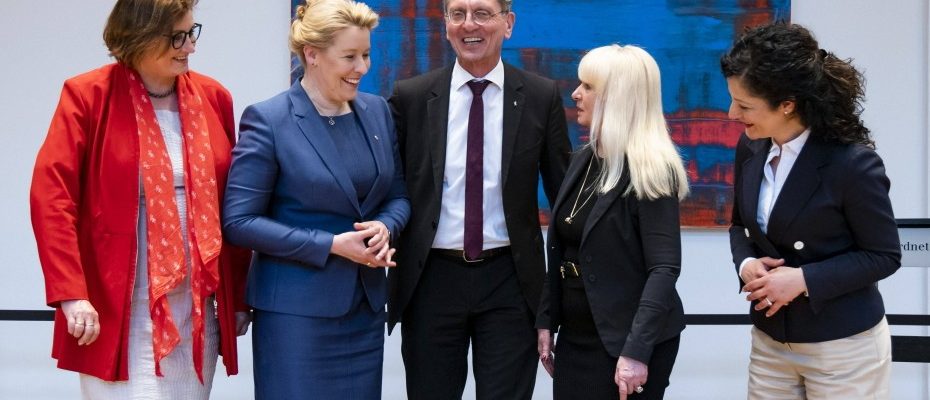After long, tough weeks of negotiation, courtship and waiting, this Monday must have finally felt easy for everyone involved. It was almost a flow with which two important markers on the way to a government coalition of the CDU and SPD were taken: shortly before 6 p.m., the delegates at the Berlin CDU party conference voted unanimously for the alliance with the Social Democrats. That was in stark contrast to the 54.3 percent yes votes, with which the SPD had just got the curve the day before. And then, on Monday evening, the Social Democrats presented their government team, whose exact composition had long been puzzled.
One person in particular was interesting beyond the borders of the capital: Franziska Giffey. The still-governing mayor and co-chair of the party had attracted attention in a variety of ways in the past few weeks: When counting the repeat election, she was neck and neck for second place with her challenger from the Grünen, Bettina Jarasch, delivered. In the end, the SPD was 53 votes ahead of the Greens. Next, Giffey resigned from office in the exploratory talks and pleaded for a coalition with the victorious CDU, for which Kai Wegner will now move into the Red Town Hall. At the same time, she announced that she would be available as a senator for the next state government. A step down one floor, that’s rather rare in German politics.
The grand coalition only has a majority of six votes
“I will take over the economics department myself,” she said in the ballroom of the Berlin House of Representatives, and gradually the impression emerged that after these turbulent and sometimes almost crazy past weeks, a new Senate would actually govern the capital. The next and last hurdle is the election of the Governing Mayor in the House of Representatives on Thursday. That could be exciting again. Because the not so big coalition only has a majority of six votes and a few SPD MPs had spoken out against the alliance with the CDU.
SPD General Secretary Kevin Kühnert, a party member in Berlin and not a friend of the grand coalition himself, called on disappointed SPD members to stay in the party that afternoon. In view of demands for a fresh start in the SPD state presidency and the replacement of Franziska Giffey and Raed Saleh, Kühnert ruled out running for the state presidency. “I’m a member of the Bundestag and general secretary of the federal party,” emphasized Kühnert. “I don’t have time for other tasks.” He himself did not want to reveal how he voted as a member of the Berlin state association, but called on the designated new governing mayor Kai Wegner to unite the city “and not to divide it further”.
In the evening, Raed Saleh himself saw above all a means of changing the minds of the opponents of the coalition: “Pillow, plough, plough.” A recipe that was consistent with Wegner. At the CDU party conference, he had repeatedly emphasized that his future Senate would “tackle” and “work hard”.
In the election campaign, the CDU “together convinced Berlin,” Wegner told the delegates. “I can only say: We can do Berlin.” The CDU is diverse and it can also surprise. In the case of the CDU, this included above all an occupation: The Vice President of the Federal Office for the Protection of the Constitution Felor Badenberg, 47, is to become a Senator for Justice for the CDU. The independent lawyer came to Germany from Iran as a child and studied in Cologne.
Wegner also thanked Saleh and Giffey for the good negotiations on the joint coalition agreement. “There’s new trust here.” At the same time, Wegner also pointed out its limits and made it clear that the competition with the SPD for the next election will start on Thursday. In 2026, the Berliners, who would not have voted for him now, should also say: “That was good with the CDU, we will continue to rely on it.” The day before, Franziska Giffey had promised something similar for the SPD.

